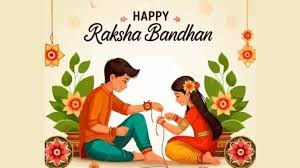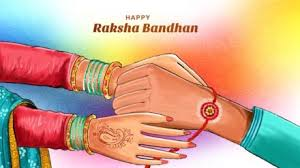raksha bandhan
Raksha Bandhan, also known as Rakhi, is a significant festival celebrated primarily in India, symbolizing the bond between brothers and sisters. Here’s an in-depth look at the festival, its traditions, and the way it is celebrated.
Table of Contents
Historical and Cultural Significance
Raksha Bandhan translates to “the bond of protection,” and it is deeply rooted in Indian culture and traditions. Its significance lies in the unique bond it fosters between siblings, particularly the protective relationship between brothers and sisters.
The festival has various legends associated with it, reflecting its deep historical roots:
- The Legend of Rani Karnavati and Humayun: One of the popular stories behind Raksha Bandhan is that of Rani Karnavati of Chittorgarh and Mughal Emperor Humayun. According to the tale, when Rani Karnavati’s kingdom was under threat, she sent a Rakhi to Humayun, seeking his protection. Moved by her plea, Humayun came to her aid, reflecting the spirit of the festival.
- The Story of Lord Krishna and Draupadi: Another significant legend is that of Lord Krishna and Draupadi. During a dice game, Draupadi was disrobed in the court of Hastinapur. In her distress, she called upon Lord Krishna, who protected her honor by ensuring that her sari kept extending. In gratitude, Draupadi tied a Rakhi to Krishna, symbolizing their deep bond of protection and friendship.

Traditions and Rituals
Raksha Bandhan is celebrated with much enthusiasm and joy, involving a series of rituals that highlight the festival’s essence:
- Preparation: Days before the festival, sisters prepare for the occasion by buying Rakhis (decorative threads) and gifts. They also clean and decorate their homes to create a festive atmosphere.
- The Rakhi Ceremony: On the day of Raksha Bandhan, sisters tie a Rakhi around their brothers’ wrists. The Rakhi is often adorned with colorful threads, beads, and sometimes embellished with small religious symbols. This act symbolizes the sister’s love and prayers for her brother’s well-being and prosperity.
- Pooja and Prayers: The ceremony typically begins with the sister performing a small pooja (ritualistic worship). She applies a tilak (a mark on the forehead) to her brother, offers him sweets, and prays for his health and happiness. In return, the brother vows to protect and support his sister.
- Exchange of Gifts: After the Rakhi is tied, brothers give gifts to their sisters as a token of appreciation and love. These gifts can range from traditional items like clothes and jewelry to modern gadgets and cash.
- Family Feasts: Raksha Bandhan is also a time for family gatherings. Families come together to share a meal, enjoy traditional sweets, and celebrate the bond between siblings.
Regional Variations
While Raksha Bandhan is celebrated throughout India, its observance can vary based on regional customs and practices:
- North India: In states like Punjab, Haryana, and Uttar Pradesh, Raksha Bandhan is marked by elaborate ceremonies and feasts. Sisters often prepare traditional sweets like kheer (rice pudding) and barfi (sweet confection) to offer to their brothers.
- West India: In Gujarat and Maharashtra, the festival is celebrated with special prayers and rituals. Sisters often use Rakhi threads that are intricately designed and may include gold or silver threads.
- South India: In South Indian states, Raksha Bandhan may be celebrated with a focus on traditional rituals and regional delicacies. Some families incorporate local customs, blending Raksha Bandhan with regional festivals.
- East India: In West Bengal and Assam, Raksha Bandhan is known as Rakhi Purnima. The festival is observed with a similar spirit but may include regional variations in the rituals and celebrations.
Modern Trends and Global Celebrations
In contemporary times, Raksha Bandhan has evolved, and its celebration has spread beyond India. Indian communities across the globe, including in the United States, Canada, the UK, and Australia, celebrate Raksha Bandhan, maintaining the core traditions while adapting to local contexts.
Modern Trends:
- Digital Rakhi: With the advent of technology, many people now send Rakhi through online platforms. E-commerce sites offer a range of Rakhis and gifts that can be delivered to loved ones anywhere in the world.
- Eco-Friendly Rakhis: There is a growing trend towards eco-friendly Rakhis made from natural materials, reflecting a broader awareness of environmental issues.
- Cultural Fusion: In multicultural societies, Raksha Bandhan is sometimes celebrated alongside other cultural festivals, showcasing a blend of traditions and practices.

Challenges and Adaptations
While Raksha Bandhan is a joyous occasion, there are challenges and adaptations that families may face:
- Geographical Distance: Siblings living far apart may find it difficult to celebrate together. In such cases, digital communication and sending Rakhi and gifts through mail or online services help bridge the gap.
- Changing Dynamics: The traditional gender roles associated with Raksha Bandhan are evolving. Many people now view the festival as an opportunity to celebrate the sibling bond, regardless of gender, and focus on mutual love and respect rather than the protective aspect alone.
- Urbanization and Modern Life: In urban settings, where families may be smaller and more dispersed, the festival’s celebration may be less elaborate. However, families make efforts to maintain the essence of the festival through smaller, intimate gatherings.
https://indianfastearning.com/
Conclusion
Raksha Bandhan, celebrated on August 19, 2024, is a festival that highlights the unique bond between brothers and sisters. It blends historical significance with contemporary practices, making it a cherished occasion for many. As families come together to celebrate, Raksha Bandhan continues to be a vibrant expression of love, protection, and familial harmony, resonating with both traditional and modern values. Whether through traditional rituals or contemporary adaptations, the spirit of Raksha Bandhan remains a testament to the enduring strength of sibling relationships.







